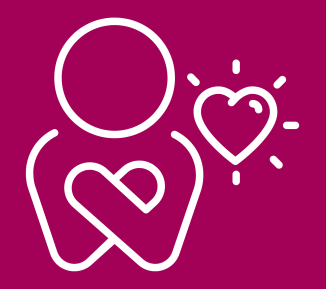There are many ups and downs, joys, and challenges that come with being a parent. And through it all, it’s vital that parents look after their mental health.
As the saying goes, you can’t pour from an empty cup. This feels especially true for parents, who continuously pour love and care into their children.
As a parent, you can face all kinds of challenges to your mental health. One challenge shared by many parents is stigma.
Stigma describes negative attitudes and beliefs about certain groups of people. Experiencing stigma can feel isolating and lonely. It might stop you from sharing your feelings or reaching out for support, often because of feelings of shame or fear of judgment.
Two inspiring young mums share their experiences of stigma, offer advice to other young mums, and share what’s helped them look after their mental health and wellbeing throughout their children’s early years.
Have you ever experienced stigma in a healthcare setting?
Jayde:
"Having my son at 15, I was always afraid to attend the GP or any healthcare setting as they would always ask me if I had a social worker. It often felt like they assumed that because I looked so young, I required additional support. Or they assumed that I was not coping, which in fact was far from the case.
"One situation was when my son jumped off the sofa and banged his head quite hard and I rushed him to A&E. Most parents would be able to relate with the fact that some toddlers truly believe they are Spiderman, and in this case that’s exactly what my son thought.
"As soon as I rushed in, I was in such a panic that I was begging for help. I remember going into the room and one of the immediate questions was, 'do you have a social worker', even before asking how it had happened.
"This made me feel like I couldn’t even trust the nurse and that she didn’t believe that I have a 3-year-old child that was just playing around. Instead, it felt like I had done that to him."


Raiye:
"I have experienced stigma within the healthcare system on many occasions. An example would be when we were sent to another GP for an emergency appointment, when our registered practice had no appointments available. We went because my son Rome was experiencing extremely dry lips due to the change in season.
When we arrived, Rome was quite distressed as he has negative feelings about seeing the GP. Also, due to our period of housing problems he was suffering from lack of sleep and our appointment was at 5pm.
"I encouraged him to enter the room and had many looks from the reception staff. When Rome responded to this by saying, 'what are you looking at?', the staff began to whisper amongst themselves. My son has neurodivergent needs and instead of acting out of compassion, they viewed my son’s tantrum as amusing.
"In the doctor’s room Rome began to cover his mouth and giggled. The doctor was not impressed by Rome’s friendly personality and seemed as though she wanted to be done with the appointment. She said it was simply a dehydration problem and subscribed any prescription ointment without physically seeing his lips.
"When I explained to Rome it was time to leave, he threw a tantrum as he struggles with transitions. The doctor continued to rush us, explaining that she had someone else to see. Rome believed he had done something wrong and said, 'I was just playing'. I simply responded by saying, 'I know it’s not your fault'.
The doctor responded to this by asking if we have support at home. I asked what she meant by that, and she responded to ask if his dad was around. I explained I was a voluntary single parent and I don’t need support at home as my child is not difficult. I immediately left feeling so judge, ridiculed & humiliated."
Having my son at 15, I was always afraid to attend the GP or any healthcare setting as they would always ask me if I had a social worker.

Has stigma ever stopped you from talking to your family or friends about your mental health?
Jayde:
"For a long time, mental health was a topic I would never speak to family and friends about, often because I wanted to put on a ‘show’ that I was doing fine as a young mum.
"It was the fear of being judged as a failure mum, as well as because it would be dismissed with responses such as ‘get on with it’ or ‘what do you expect being a young mum’.
"As I grew in age and began to seek support for my mental health, I soon realised that mental health is not just about bad days. It’s simply about the state of your mind. Once I understood this, I gained the confidence to help others. And I found that speaking to others about how they’re feeling also helped me to feel better and greater about myself."
Raiye:
"I have explained to an (ex) friend in the past I wanted to move home as our living conditions were extremely bad and I was saving for a home. She laughed and said I would be 'nothing but a council estate baby mum'.
"On occasions when I explained to my mum I needed a break and I was sleep deprived, she responded by saying things like, 'welcome to motherhood', 'welcome to the club', 'that’s why you shouldn’t lay on your back', and 'you will know not to go have another one'. This completely changed my mind about having more children. It also made me believe motherhood was a never-ending pool of sacrifices and I didn’t deserve time to myself or basic needs such as sleep."
On occasions when I explained to my mum I needed a break and I was sleep deprived, she responded by saying things like, “welcome to motherhood”. It made me believe motherhood was a never-ending pool of sacrifices and I didn’t deserve time to myself or basic needs such as sleep.

What do you think others can do to help parents experiencing stigma?
Jayde:
"I think it’s important when supporting young parents to empower them through reminding them of all the good things they are doing. Being a parent regardless of age comes with struggles and it shouldn’t be because we are young that’s all we speak about.
"I would also encourage professionals, friends and family to not be afraid to be supportive but be conscious when you are telling young parents what to do through assumptions.
"It’s important to even remind yourself that parenthood is a journey and see yourself as the person suited to support and show compassion."
Raiye:
"It would help if people shared positive experiences of parenting, rather than constantly focusing on the negative.
They could give practical advice on strategies that helped them navigate parenthood such as sleep tips, eating habits, or supplements they take that help them.
They could also remind them that they are doing amazing and highlight the good things they do."
What do you think health or mental health professionals can do to help parents experiencing stigma?
Jayde:
"I think health professionals, as great as they are, should sometimes put their ‘professional hat’ away and just be a human with a heart and understanding.
"Taking the time to listen and not assume can go a long way, especially when speaking about mental health."
Raiye:
"Professionals should be thoughtful in their speech and voice questions in a gracious and respectful manner. They should not make assumptions, and ask questions to gain a better understanding of the individual they are dealing with. And they should manage their time to avoid making patients feel rushed."
Tips for looking after your mental health
We asked Jayde and Raiye to share what's helped them look after their mental health in the face of stigma. Here's what they said:
Self-care

Mental health education

Supportive peers

Mindset training

Exercising

Looking after your body

What advice would you give to other young parents?
We asked Raiye and Jayde what they'd say to other young parents like them, who are struggling with stigma. Here's what they said:
You are amazing. You have overcome so much and this is just the beginning for you. The opinions of others are not a reflection of you or your capabilities. Don’t internalise them but keep speaking up, your voice deserves to be heard.
Remember all the amazing things you are doing well and to not be afraid to seek the help you deserve.
Advocate for yourself when they feel confident to do so and raise awareness when you feel stigmatised. Sometimes education is needed to remind others that they are doing something wrong.
Support and resources
For parents and families:
- Family Action and Family Rights Group both offer a range of practical and emotional support for parents.
- Family Lives offers online parenting courses and advice videos, among other support for parents.
- Home-Start helps families with young children through challenging times, offering home visits from trained volunteers, group support and help getting local services.
- Search for 'Family Hubs' near you, to get support for children, young people and families. This can include baby groups and parent classes, counselling services and financial advice.
- Find parenting advice and resources or connect with other parents on the NetMums website.
- Get online parenting advice through Action for Children's 'Parent Talk'.
- If you're worried about your child's mental health, call the YoungMinds' Parent Helpline on 0808 802 5544 (UK).
For single parents:
- Gingerbread offers advice and support for single parents.
For young parents:
- The Lullaby Trust offers support for young parents through the Little Lullaby project.
Our work with mums
Young Mums Connect
Young Mums Connect is a three-year peer support project for young mothers (up to 25 years) that uses a creative, whole-family approach to mental health prevention within a community setting.
Single Parents Wellbeing Workshops
Run by single parents for single parents, this programme provides a compassionate, motivated and empowering approach to being a single parent.






